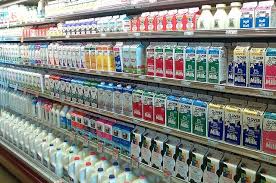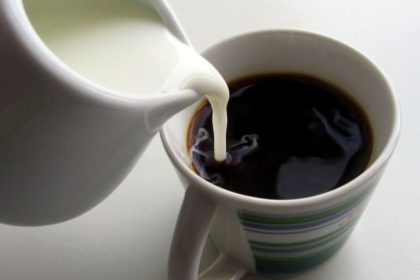 Whole milk, 2% fat, 1% fat, nonfat, soy, almond, rice, coconut, and chocolate. With so many varieties of milk to choose from at the supermarket, it’s no wonder shoppers are so confused. Get the nutritional facts and find out which milks are the best, acceptable and the worst.
Whole milk, 2% fat, 1% fat, nonfat, soy, almond, rice, coconut, and chocolate. With so many varieties of milk to choose from at the supermarket, it’s no wonder shoppers are so confused. Get the nutritional facts and find out which milks are the best, acceptable and the worst.
The Best Milk
Organic Skim Cow’s Milk (a.k.a. fat-free or nonfat): Skim milk is rich in key nutrients with none of the saturated fat that’s in 1%, 2% and whole milk. Milk is an excellent source of:
- Calcium: 300 mg; 30% DV**
- Vitamin D: 120 IU*; 30% DV
- Vitamin B-12: 1.2 mcg; 20% DV
- Protein: about 8 grams per glass (15% of the protein that an average 150-lb person needs per day)
Organic milk is free of hormones, antibiotics and pesticides, but not sodium. Milk has about 100-130 mg sodium per 8-oz. glass, so take that into account if you drink several glasses a day and you’re following a low-sodium eating plan (1500 mg sodium/day).
* IUs = International Units.
** DV = Daily Value. DVs were developed by the U.S. Food and Drug Administration to help consumers compare the nutrient contents among products within the context of a total daily diet.
Lactose-Free Nonfat Milk:
 If you’re lactose intolerant, choose Lactaid® fat-free milk. Better yet, get Lactaid® fortified with bone-building calcium.
If you’re lactose intolerant, choose Lactaid® fat-free milk. Better yet, get Lactaid® fortified with bone-building calcium.
Low Fat is Not So Low
When learning to read product labels, most people are taught to evaluate a product’s nutritional value by its percentage of total calories from fat. However, when it comes to milk, the government allows the dairy industry to measure fat as a percentage of total weight – not calories.
At first glance, milk that is 1% or 2% fat may seem to have just a small percentage of fat. However, the fat in 2% milk is actually 2% of the total liquid weight which means something completely different.
Measuring the Fat in 1% and 2% Milk
Here’s what you get in an 8-oz glass of 2% milk:
- 122 total calories
- 45 fat calories (5 grams) – 37% of the calories are from fat
- 27 calories (3 grams) of the total fat are saturated
Here are the actual fat profiles in the following milks by calories:
- Whole milk, 49% of calories are from fat / 58% saturated fat
- 2% milk, 37% of calories are from fat / 63% saturated fat
- 1% milk, 18% of calories are from fat / 63% saturated fat
Another “Best” Milk
Fortified Soymilk: Like nonfat cow’s milk, unsweetened fortified soymilks are also a best choice because you’re getting all the key nutrients that are in cow’s milk – calcium, vitamins D, B-12, and protein – and none of the artery-clogging saturated fat.
Soymilk is be a better choice if you’re watching your sodium. It contains 30-46% less sodium than cow’s milk – about 70 mg compared to 100-130 mg.
Acceptable Milks
A lmond Milk and Rice Milk: Unsweetened dairy substitutes like almond and rice milks are good sources of calcium, vitamin D, and vitamin B-12, but only contain about two grams of protein (one quarter the amount that’s in soy and cow’s milk).
lmond Milk and Rice Milk: Unsweetened dairy substitutes like almond and rice milks are good sources of calcium, vitamin D, and vitamin B-12, but only contain about two grams of protein (one quarter the amount that’s in soy and cow’s milk).
So for every cup of almond or rice milk, add a lean protein-rich food to your daily eating plan, such as:
- One-half cup beans (about 7 g protein)
- One large egg (6 g protein)
- Tofu, 3 oz (8 g protein)
The Worst
Coconut Milk: Avoid coconut milk (unsweetened and sweetened) due to the amount of deadly saturated fat it contains. Many contain NO calcium or protein or at best, a very small amount. One cup contains:
- 50 total calories
- 45 fat calories (5 grams) – 90% of the calories are from fat. Worse yet, the fat calories are from saturated fat – the same amount in a single-patty cheeseburger.
All of the total fat calories are unhealthy saturated fat – a whopping 5 grams per cup. That equates to the same amount of saturated fat in a Burger King® cheeseburger!
Milk with the Extras
Read the ingredient list and keep it simple. Choose plain milk instead of chocolate or strawberry-flavored varieties. If skim milk, soymilk, or any other milk contains added sugars and other unhealthy additions, it is not a good choice.
 Drink Your Milk
Drink Your Milk
Limit your servings of dairy and dairy substitutes to two servings per day. Enjoy the “best” and “acceptable” milks. Read the product labels and choose milk with 0 g of saturated fat and a calorie-to-sodium ratio that is 1 to 1 or very close to it.
![]() Fit Tip: For a healthy heart, your intake of saturated fat should be less than 5-6% of your total daily calories. That means if you need about 2,000 calories a day, less than 100-120 calories (or 11-13 grams) should come from saturated fats.
Fit Tip: For a healthy heart, your intake of saturated fat should be less than 5-6% of your total daily calories. That means if you need about 2,000 calories a day, less than 100-120 calories (or 11-13 grams) should come from saturated fats.



